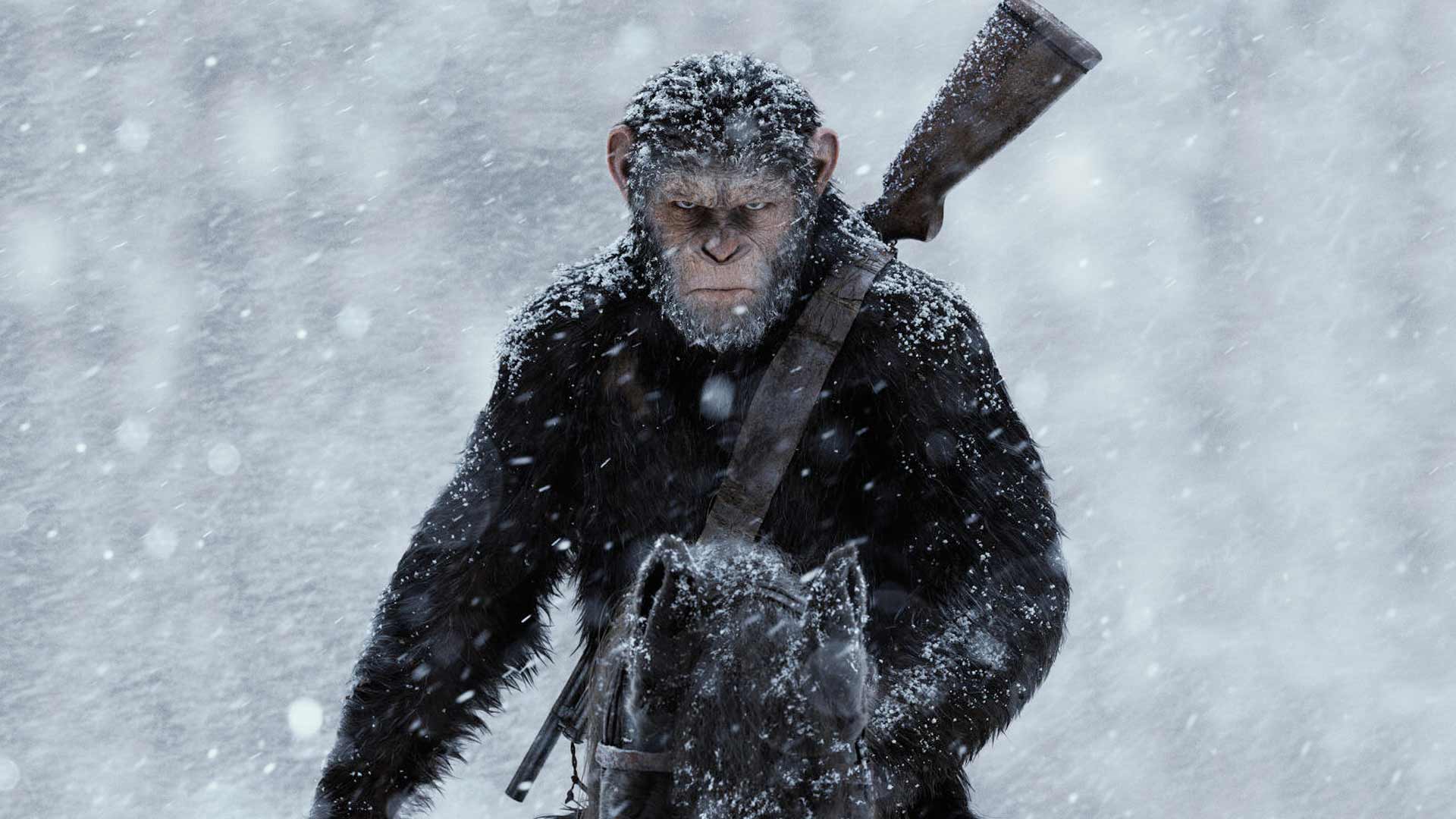The renewed relevance of classic sci-fi movie franchise, Planet of the Apes was certainly unexpected, after the release of 2011’s superb Rise of the Planet of the Apes, which started a new storyline long before the apes would conquer Earth. Even more unexpected was the fact that Rise of the Planet of the Apes’ sequel, 2014’s Dawn of the Planet of the Apes, was an even stronger movie, taking the themes and commentary established in the original, and pushing it to new and exciting heights. Most amazing of all? The third movie in the current Planet of the Apes prequel/reboot trilogy, War for the Planet of the Apes, continues to elevate the franchise still, once again surpassing the already excellent final product of Dawn of the Planet of the Apes, and subsequently going down as probably the best conclusion to a pre-conceived movie trilogy in many, many years, probably since 2007’s The Bourne Ultimatum.
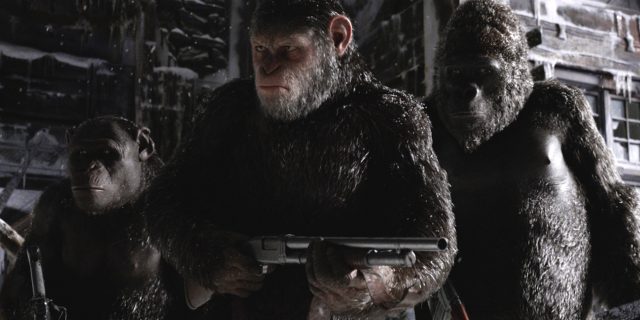
This movie is a truly incredible achievement, especially in a Summer where every major blockbuster that doesn’t star a superhero or superhero team has been a misfire up to this point. One thing you should be prepared for however is that the titular ‘war’ in War for the Planet of the Apes doesn’t totally represent a spectacular, action-packed climax. Instead, this movie begins to lay the foundation for the original 1968 Planet of the Apes movie, or perhaps some altered version of it for this new timeline, by focusing on the psychology, themes and questions of inevitability when it comes to battling against nature. As with its two superb predecessors, War for the Planet of the Apes is an outstanding Summer blockbuster that’s as smart as it is exciting, and rounds off the origin story of humanity’s future ape overlords on a virtually flawless note!
Andy Serkis returns to the central role of Caesar in War for the Planet of the Apes, now faced with the foreshadowed menace from the end of Dawn of the Planet of the Apes coming to his metaphorical doorstep. Caesar now finds himself faced with a battle that he never asked for, against the desperate remains of humanity that see themselves as the heroes of our species, making a last stand against the dominant new ape strain that is starting to spread across the planet. This desperation has major emotional consequences for Caesar, and this leads to Serkis delivering his best, most impactful performance as Caesar to date, which is saying a lot, since Serkis deserves Oscar consideration for every single one of these Planet of the Apes prequel/reboot movies.
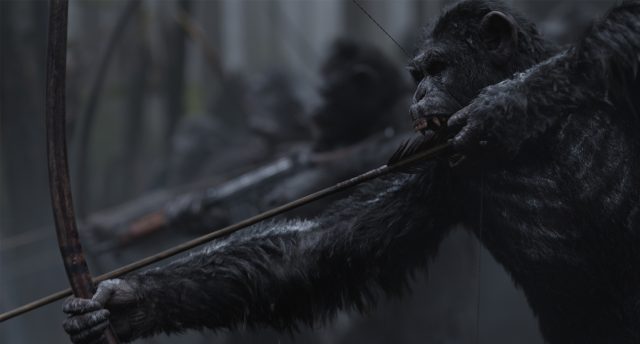
We also get returning apes from the previous movies in War for the Planet of the Apes, namely Caesar’s allies, Maurice, Rocket and Luca, as well as Caesar’s wife, Cornelia, along with Caesar’s son, Blue Eyes, and while it’s difficult to talk much about them without spoilers, rest assured that they remain standout characters in every respect here. We also get a couple of new character additions on the apes’ side, including Bad Ape, played by Steve Zahn, who is something of a comic relief character in an otherwise very dark and dramatic movie, but one that is actually portrayed very well, and has enough of an emotional center to offset his goofy exterior. Likewise, there is another big risk with the characters that once again tangles them up with the humans, and again, I unfortunately can’t discuss this human element without considerable spoilers, but I will say that fans of the classic Planet of the Apes movies should be pretty happy with how this personality spiritually bridges together these new movies with the old ones, at least to some degree.
For the first time though, the humans really do have an emotional struggle that feels perfectly on par with the apes in War for the Planet of the Apes, since we get a truly excellent antagonist in this movie, Colonel McCullough, played by Woody Harrelson. Yet again, I can’t discuss this character much without some key spoilers for the movie, but I will say that McCullough is an expertly crafted villain who provides not only a worthy obstacle for Caesar and the apes’ survival, but is also given a very effective, dramatic and genuinely sympathetic arc, which forces the audience to ask difficult questions about what they would do if they were in the same situation as McCullough in several respects. As great an antagonist as Koba was in Dawn of the Planet of the Apes, McCullough really does feel like the best antagonist of the Planet of the Apes prequel/reboot trilogy, and is probably one of the best antagonists in the franchise’s entire history, if I’m being honest!
Much like the character details, I can’t discuss too many specifics about the plot of War for the Planet of the Apes without giving away some crucial story details. This is definitely a movie that audiences will want to know as little as possible about going in, since there are quite a few twists and subverted expectations in this movie, as well as some clever lead-ins to the story material of the classic Planet of the Apes movies. How everything comes together is realized brilliantly in every respect, and provides a rare example of a perfect conclusion to an exceptional trilogy.
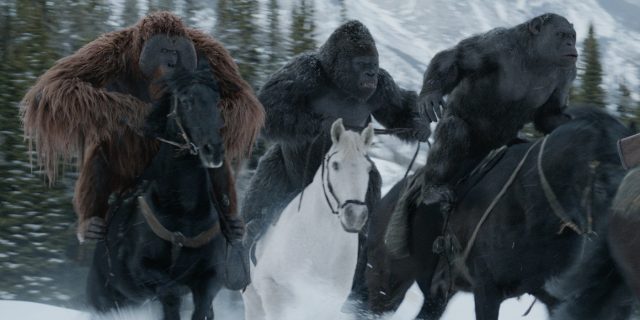
Again, I must stress however not to be misled by the title. If you’re expecting a big, prolonged climactic battle between humans and apes, that’s not really what this movie involves. Instead, War for the Planet of the Apes is more accurately a bleak post-apocalyptic drama, and one that actually has even less action than Dawn of the Planet of the Apes did when it comes down to it. Nonetheless, this is a riveting, emotional and effectively dark story about how everything ends for the struggling humans and Caesar’s apes, who find themselves fighting a conflict that they don’t actually want anything to do with. This provides a wonderful way to re-interpret the conflicts driving the classic Planet of the Apes movies, while also closing out this modern trilogy on pretty much the perfect note.
(NOTE: The spoiler section, when clicked, discusses connections to the classic Planet of the Apes movies, as well as potential post-credits scenes, and other potential sequels in these new prequel/reboot movies)
There are also no post-credits scenes in War for the Planet of the Apes, which also ends with both the last of humanity’s militant forces and Caesar both being seemingly killed, visibly cementing this movie as the rigid conclusion of the current story arc. 20th Century Fox is seemingly pondering a fourth movie for this revised Planet of the Apes canon that may begin a new story arc, but it looks like Caesar won’t be a part of it, if this movie’s ending is any indication.
Rumblings about Dawn of the Planet of the Apes antagonist, Koba being resurrected in this movie also only turned out to be merely half true, since Toby Kebbell does reprise his role as Koba in War for the Planet of the Apes, but only as an apparition that torments Caesar in his dreams. Instead, it feels like the role that Koba would have had in this movie, had the filmmakers actually found an effective excuse to resurrect him, instead went to another ape called Donkey, who is an ape working alongside McCullough’s human forces against Caesar.
Matt Reeves returns to direct War for the Planet of the Apes, after previously helming Dawn of the Planet of the Apes, and once again, his direction is pretty much flawless here. Every shot and every performance in War for the Planet of the Apes is excellent, with this movie having a beautiful and potent sense of atmosphere and drama throughout. Even with less action scenes than you might expect, War for the Planet of the Apes instead finds its drama and excitement from just how well-realized its psychological struggle is, and a huge part of that comes from how masterful the cinematography and presentation generally are.
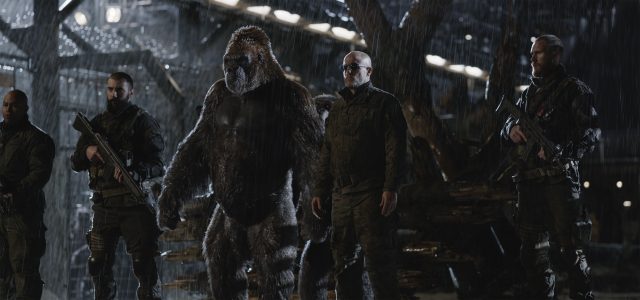
Reeves is also effectively taking the opportunity to have War for the Planet of the Apes skew ever closer to the feel of the classic Planet of the Apes movies, since War for the Planet of the Apes concludes the preceding story arc that sees the apes become the new dominant species on the planet. The soundtrack, visual design and other stylistic elements all hint to the prequel and classic Planet of the Apes movie sensibilities starting to bridge together here, though it’s never simply done for the sake of pandering to fans of the classic movies.
There’s an air of melancholy and tragedy that continues to be wonderfully realized in the direction here, and is arguably realized even better than it was in the previous two movies, since War for the Planet of the Apes brings home this new Planet of the Apes prequel/reboot trilogy’s themes of struggling against the inevitable. In a clever way, Reeves acknowledges that the audience knows how this is all supposed to end, yet even then, he finds a smart and inspired way to subvert expectations, and create a trilogy closer that both delivers what we know is coming, yet does so with many different turns than audiences would anticipate.
Michael Giacchino scores the soundtrack to War for the Planet of the Apes, just one week after delivering another excellent soundtrack for Sony Pictures’ and Marvel Studios’ comparably superb Spider-Man: Homecoming. Like Reeves, Giacchino’s score leans further into the idea that the sensibilities of both the old and new Planet of the Apes movies are starting to bridge together, and that leads to Giacchino composing War for the Planet of the Apes’ soundtrack with a lot of retro flourishes. There’s a lot of old school drums, horns and other such wild war-like instruments, which both signal the twilight of humanity’s dominance over Earth, while also calling back to the classic Planet of the Apes movies in a really clever way. This is easily one of the most awesome and satisfying musical scores that Giacchino has composed, even considering his comparably great work on the score for Spider-Man: Homecoming just last week, and Planet of the Apes fans especially will definitely want to own War for the Planet of the Apes’ soundtrack to listen to at their leisure!
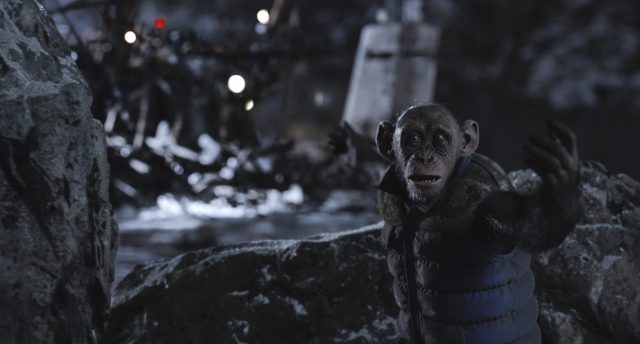
The rest of the audio design in War for the Planet of the Apes is also excellent in every respect. As fantastic as the musical score is, there are also a lot of quiet moments where the apes simply sign to one another, and Caesar addresses whatever allies he has left. These scenes are carried entirely by the excellent performances and direction, and the fact that this incredible soundtrack also knows when to stay silent only makes War for the Planet of the Apes even stronger as a movie. This sublime audio job is a huge part of what makes this movie’s drama shine so much, and there’s never a sour note in any element of the sound design.
The previous two Planet of the Apes movies effortlessly delivered motion-capture performances that genuinely felt real. Even though the ape animations are effects, they’re made to feel perfectly real and convincing by the outstanding mo-cap work of the actors portraying them. This of course remains true in War for the Planet of the Apes, which is a visual masterwork once again. This movie is positively dripping with atmosphere, and when it comes down to it, it’s so visually well-produced that it really doesn’t need a bunch of flashy action scenes to grab the audience. Instead, War for the Planet of the Apes is so impeccably put together from a visual standpoint that the visual direction alone gives you every possible reason to invest in the story, even without a bunch of barely-present exposition or action here. Just about every mo-cap actor in War for the Planet of the Apes, in particular Andy Serkis in the lead role of Caesar, really does deserve an Oscar for their work here, since this remains some of the best mo-cap work in Hollywood history.
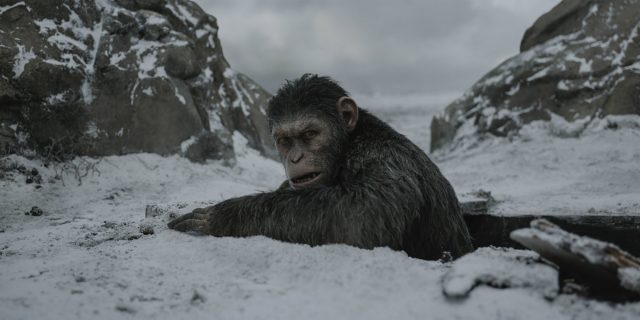
This brings me to War for the Planet of the Apes’ 3D presentation, which, just like with Dawn of the Planet of the Apes, feels like it’s only here because the studio demanded it, since every major sci-fi/fantasy blockbuster now needs to be offered in 3D. Regardless, the 3D presentation in War for the Planet of the Apes is passable, and it does add a slight bit of extended immersion to wider shots at the very least. The 3D is certainly not essential however, and if you’d rather just watch War for the Planet of the Apes flat in 2D, you can certainly do that, and not really miss anything. If you like 3D movies though, you might as well pay for a 3D ticket, since War for the Planet of the Apes doesn’t really lose anything when it’s watched in 3D, even if it doesn’t gain all that much beyond some added depth in the wide shots either. In this case, it entirely comes down to your personal preference between 3D and 2D.
War for the Planet of the Apes cements this new prequel/reboot trilogy of Planet of the Apes movies as one of the best movie trilogies in recent memory, as well as a rare example of a movie trilogy where each successive sequel is better than its predecessor, rather than worse. Frustratingly, I can’t discuss much of what makes War for the Planet of the Apes such an outstanding movie, since it’s a movie that is best experienced when knowing as little as possible about it before seeing it. Still, I can’t stress enough that, in pretty much all respects, War for the Planet of the Apes is a masterpiece, and stands alongside Wonder Woman and Spider-Man: Homecoming as one of this Summer’s top must-see blockbusters!
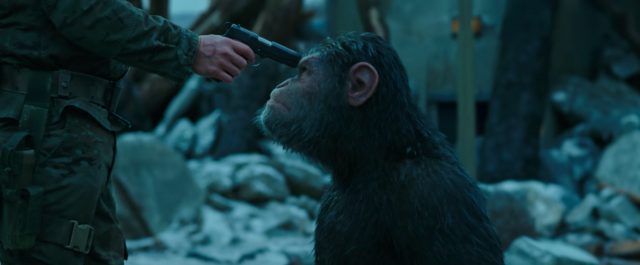
20th Century Fox has expressed an interest in continuing these new Planet of the Apes movies further, but personally, I wouldn’t mind if they just let their brilliant conclusion stand as a brilliant conclusion, as it does in War for the Planet of the Apes. Sure, this franchise is bound to live on in some form down the line, likely with new characters and a new story arc for the future, but thanks to this excellent prequel/reboot trilogy, the Planet of the Apes franchise has really never been stronger or better than it is right now, even during the height of its classic cinematic run in the 60’s and 70’s. With War for the Planet of the Apes being this trilogy’s strongest movie, the modern Planet of the Apes trilogy is bound to go down as one of the best cinematic trilogies of all time, and you absolutely must see all three of them! Much like I said during my glowing review of Dawn of the Planet of the Apes back in 2014, this is a cinematic war so perfectly realized that us humans won’t even mind knowing that we’re going to lose.

